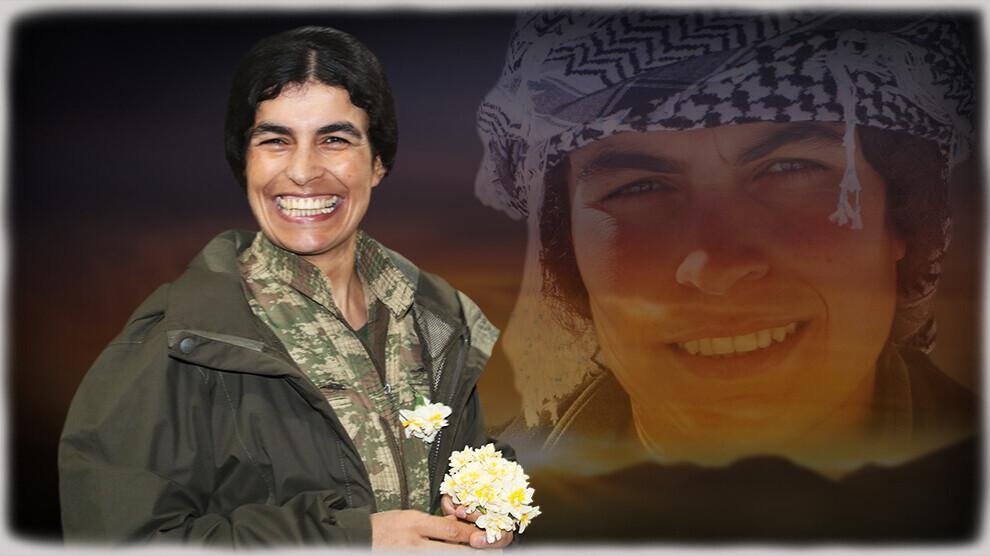
Guerrilla commander Bêrîtan Nûrhak Çiya was killed in a military operation by the Turkish army in the Mawa area of Batman (Êlih). The Kurdish woman’s real name was Sultan Dağ, and she came from a village in the province of Mardin (Mêrdîn), where she was buried on Tuesday.
The People’s Defense Forces (HPG) have published a statement in which they honor Bêrîtan Nûrhak Çiya as a courageous commander of the Free Women’s Units (YJA Star) and a militant advocate of women’s liberation. The fallen guerrilla was a member of the regional command in the Gabar region and fought in many areas of Kurdistan for over two decades. The HPG expressed its condolences to Bêrîtan Nûrhak Çiya’s family and the Kurdish people and said that their struggle continues and their dream of a free Kurdistan remains alive.
Code name: Bêrîtan Nûrhak Çiya
First and last name: Sultan Dağ
Place of birth: Mêrdîn
Mother and father’s names: Fatma–Recep
Date and place of death: 23 June 2024 / Botan
Bêrîtan Nûrhak Çiya was one of the women from Mardin whose personality is still shaped by the Neolithic culture. The longing for freedom is passed down from generation to generation and has taken on a more conscious form through the Kurdish liberation movement. With this awareness, the women of Mardin today continue their resistance against male rule.
Bêrîtan was born in the Omerya region and came from a family with a long tradition of resistance. Her grandfather told her about previous uprisings in various parts of Kurdistan in which members of the family were involved. This gave her an early awareness of her Kurdish identity and the reality in Kurdistan. Her parents were very interested in the freedom movement that arose under the leadership of the PKK and instilled corresponding values in their children. Bêrîtan was still a child when she first saw the guerrillas who had come to her village. The first guerrilla Bêrîtan met was Hozan Mizgîn (Gurbet Aydın), who left a deep impression on her.
When Bêrîtan was five years old, her village was burned down by the Turkish state and her father was brutally tortured in front of her eyes. The family had to move to Mardin, but she resolved to return to her village one day as a guerrilla. Later, the family moved to a large Turkish city. There Bêrîtan became active in the youth movement and read books by Abdullah Öcalan and about the guerrillas. Öcalan’s analyses of the women’s issue were like a revelation because she always felt that the role assigned to women in society was contradictory and that she did not feel like she belonged.
When her brother Nurhak (Halit Dağ) joined the guerrillas, she wanted to follow him to the mountains. Two of her attempts failed, and it was not until 2002, with great difficulty, that she managed to reach a guerrilla group in Van.
Bêrîtan went to Qendîl from Van. The period was marked by attempts at internal division, which Bêrîtan resisted with great strength of will. Later, she was able to attend training for new guerrillas. She stayed in Qendîl for about four years and developed her skills in ideological, military and organizational struggle. She considered a purely emotional bond with Abdullah Öcalan to be hypocrisy. For her, it was important that this bond had an ideological basis and was based on constant further training. To this end, she attended training courses at the Şehîd Berîtan Women’s Academy and later at the Military Academy named after Mahsum Korkmaz. After that, she spent three years in Metîna and two years in the Zagros region, gaining her first experience as a commander. Her great anger at the enemy was reflected in her fighting.
She took part in revolutionary operations and played a leading role with her courage, her offensive approach and her almost inexhaustible energy. Every successful action was an outlet for her desire for revenge, which had been building up for years.
The death of her brother Nurhak in 2011 became a reason for her to intensify her fight. She took on strategically important tasks that required great trust in her. After further training at a PAJK academy, she worked in the education sector in Heftanîn for two years. She then went to Bakur, in North Kurdistan, and thus fulfilled a long-held dream. She spent a short time in Gabar and then in Kerboran, where she promoted the resistance for self-government. Her further path took her via Gabar back to the Medya Defense Areas to the Haki Karer Academy and from there to the resistance in Metîna. Most recently she was back in Gabar and took on responsibility in the regional command.
Bêrîtan Nûrhak Çiya was killed in an airstrike in the Mawa area.
In other news, four guerrillas were killed in a military operation by the Turkish army in the Beytüşşebap (Elkê) last Friday. Their bodies were taken to the State Hospital in Şırnak (Şirnex). One of the fallen guerrillas has not yet been identified.
According to information available, the other fallen guerrillas are Sefer Temel (Rüstem Çekdar Kato), Yılmaz Sala (Kamuran Gever) and Basri Cin (Brûsk Kato). The People’s Defense Forces (HPG) have not yet commented on the issue.
Sefer Temel was buried in the village of Sêtkar in Beytüşşebap, Yılmaz Sala in Hirmîn in Yüksekova (Gever). Basri Cin’s body will be buried in Silopi when finally handed over to his family.